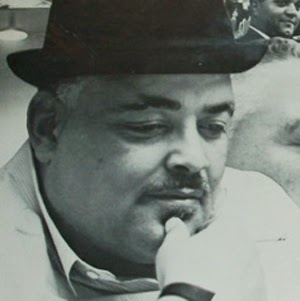by Dwight L. Quinn
When I was growing up in East St. Louis, music was every
where, at night live bands was heard coming out of the
doors of almost every lil club or travern on a corner.
And don't let the club be close to a Church were they are
having night service,now you're getting it all. On radio
there's a Live, remote broadcast going a local band is
jamming and people are having themselves a good time.
There were clubs like this on both sides of the wateri.e
as we would than describe the division of the Mississippi
River. The Club that was getting popular than in the early
60's was the The Blue Note Club,located at 4200 Missouri
Avenue, in East St. louis,Illinois owned by the late Leo
Gooden. Leo, as most people, who knew him would address
him was an important local St. Louis mover-and-shaker
whose ear for talent helped him assemble one of the best
bands of its time, assembled initially to be the house
band at Gooden's Blue Note Club.
A look into the mini-soul empire of Leo Gooden -- an tiny
little enclave in East St Louis that was making some mighty
hip music in the early 60s! Gooden wore many hats at the time
-- politician, club owner, and local businessman -- but he
also put together his own band and record label L. G. Records.
He worked in a very hip mix of R&B and early 60s soul jazz modes!
Through his nightclub, The Blue Note, Gooden came into contact
with a variety of great musicians, both national and local --
and he brought their inspiration to play on sessions recorded here
for his LG family of labels – he is featured on a handful of
singles and two rare LPs.
Early 60s East St Louis jazz band. Originaly assembled to be the
house band at Leo Gooden's Blue Note nightclub. The group, anchored
by the Hammond B-3 playing of Don James, the dynamic drumming of
Kenny Rice, and the tenor sax work of Charles "Little Man" Wright,
pre-shadowed the organ-led jazz combos that appeared later.
Albert King would frequently set in with the Band and was given
the opportunity to play on several Leo Five recordings,"Worrisome
Baby","Lonesome",and "You Threw Your Love On Me So Strong". Other
local greats that worked with Leo and his L.G.Record Label was
Ccharles Drain and Jamie Ross.
Members of Leo's Five:
Charles Wright, Don James, Fred Jackson, Leo Gooden
The 60's bands couldn't have been so widely recognized if it hadn't
been for the newer upcoming Radio personalities,bringing in a new
way of introducing music to the general listening public one of those
pioneering radio personalities of the time in the Greater St. Louis
was Spider Burks one of St. Louis’ first black disc jockeys, and
he is remembered for giving jazz an urban identity in St. Louis market.
He had graduated from Hampton Institute and began working at KXLW here
in 1947. During his stint at that station, which lasted until 1956,
Spider became a huge moneymaker for the station and himself.
He got the job initially when a radio shop owner on Easton Avenue
sponsored a half-hour block of time and used Spider as his disc jockey.
Things went so well that the station hired him, and he would sell
advertising to supplement his income.
He’d bring in his own records, and his two shows, “After School Swing
Session” and “Down the Alley Behind My House” were huge favorites of the
high school set. The record companies soon realized Spider Burks’ show
could really “sell” their product.
Burks also worked as a disc jockey on KSTL, KADY/KADI-FM and KATZ,
leaving the business in 1969.
St. Louis and East St. Louis histroically been a huge contributor and
weight station for all types of music,especially the sounds of blues,
gospel and jazz.Making St.Louis not only the Gateway to the West,but
also the one of the Main birth places of the Blues.
Sources:Ace Records,East St. Louis Library Archives,Monitor and
D.L. Quinn


.jpg)